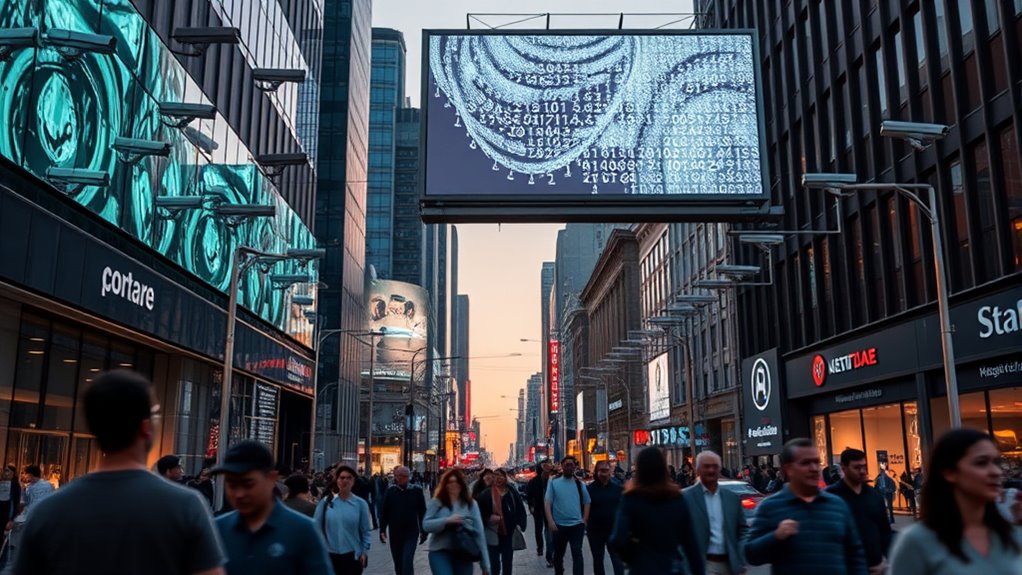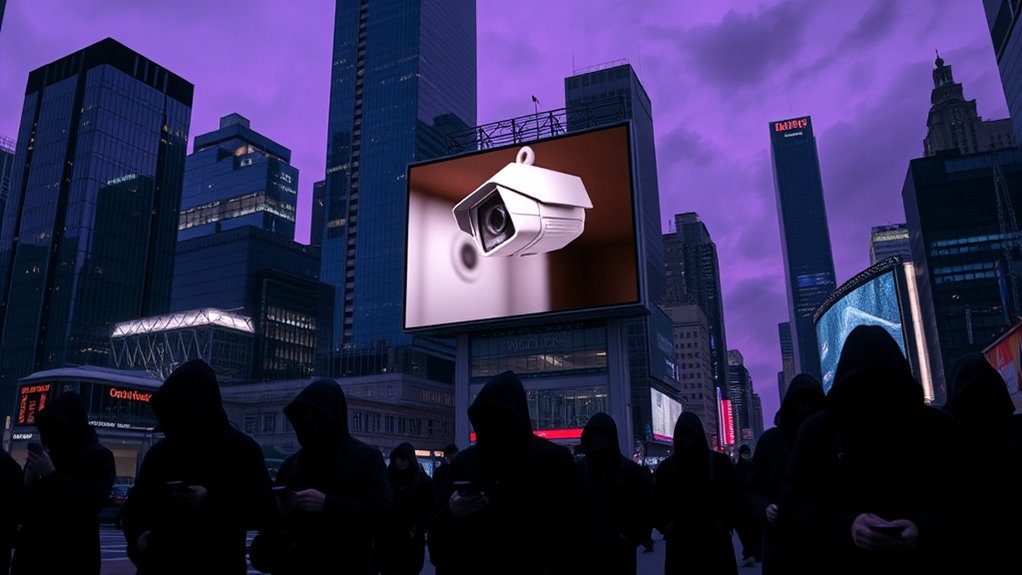Balancing state security with civil liberties is a complex ethical challenge you face today. Governments argue that surveillance helps prevent threats like terrorism and cybercrime, but this can come at the cost of your privacy rights. Excessive oversight risks government overreach and misuse of personal data, while too little leaves society vulnerable. Finding a fair middle ground involves transparent limits and ethical oversight. To understand how this balance can be achieved, explore the nuanced perspectives ahead.
Key Takeaways
- Balancing security needs with individual privacy rights requires transparent, proportionate surveillance policies.
- Ethical frameworks and oversight are essential to prevent government overreach and misuse of collected data.
- Advanced AI surveillance can enhance precision, reducing unnecessary intrusion into personal privacy.
- Democratic societies must carefully weigh collective safety against potential erosion of civil liberties.
- Maintaining public trust depends on accountability, clear limits, and safeguarding personal freedoms amidst security efforts.

Have you ever wondered whether surveillance serves the greater good or infringes on personal freedoms? It’s a question that touches on deeply held values and ongoing debates about privacy and security. When governments expand their surveillance programs, many people worry about privacy concerns, fearing that their personal information and daily activities could be monitored without their knowledge or consent. These concerns aren’t unfounded. As surveillance techniques become more sophisticated, the line between protecting citizens and invading their privacy blurs. You might feel that your right to keep certain aspects of your life private is being compromised, especially when data collection happens behind closed doors. The risk of government overreach becomes a real threat, as authorities may justify invasive monitoring in the name of national security, but end up overstepping boundaries that should protect individual freedoms.
This tension isn’t just theoretical; it’s a live issue impacting millions. Governments often justify surveillance by citing threats like terrorism, cybercrime, or social unrest. They argue that such measures help catch criminals and prevent attacks before they happen. However, the flip side is that increased surveillance can lead to a slippery slope where civil liberties are slowly eroded. When authorities have unfettered access to your personal data, it can be used not just against genuine threats but also to suppress dissent or target specific groups. This potential for abuse highlights the danger of government overreach—when state agencies operate without sufficient oversight or accountability, they risk infringing on your rights under the guise of security. Additionally, the rise of Pimple Patch technology demonstrates how targeted, discreet solutions can address specific issues without overreaching into overall privacy. Recognizing the importance of color accuracy in surveillance systems can help ensure that the data collected is both reliable and ethically obtained. Furthermore, integrating innovative technologies with robust ethical frameworks can help balance security needs with privacy protections. As AI security solutions evolve, they can provide more precise and adaptive monitoring, reducing unnecessary intrusion while maintaining safety.
Balancing security with privacy rights is no small feat. While some see surveillance as a necessary tool to maintain peace and order, others view it as a violation of fundamental freedoms. You might feel that giving up too much privacy can lead to a society where everyone’s actions are scrutinized, fostering distrust and fear. Conversely, ignoring security concerns can leave communities vulnerable to harm. The challenge lies in establishing clear limits on surveillance activities, ensuring that they are proportionate, transparent, and subject to oversight. Democratic societies often wrestle with this issue because it asks how much personal freedom they’re willing to sacrifice for collective safety. Ultimately, defending privacy doesn’t mean ignoring security; rather, it’s about finding a way to safeguard both without one compromising the other. Employing AI security technologies with proper oversight can help create a balanced approach that respects individual rights while ensuring societal safety.

Qyzue Hidden Camera Detectors, Spy Camera Detector with RF Signal & Infrared Detection for Wireless Cameras, GPS Trackers, Privacy Protection, Portable Travel Safety Tool
- Detection Modes: RF, infrared, magnetic field detection
- Sensitivity Adjustment: 5-level sensitivity for accurate scanning
- Infrared Detection: Find wired cameras using infrared light
As an affiliate, we earn on qualifying purchases.
As an affiliate, we earn on qualifying purchases.
Frequently Asked Questions
How Do Different Cultures Perceive Surveillance Ethics?
When exploring how different cultures perceive surveillance ethics, you see that cultural perceptions influence values and priorities. Some societies emphasize collective security within their ethical frameworks, accepting surveillance as necessary for safety. Others prioritize individual privacy and civil liberties, viewing surveillance as an infringement. Your understanding of these differing perspectives helps you appreciate how cultural perceptions shape policies and debates around surveillance, balancing security concerns with respect for personal freedoms.
What Are the Long-Term Societal Impacts of Increased Surveillance?
You might think that increased surveillance promises security, but it can lead to long-term societal impacts like privacy erosion and diminished social trust. When citizens feel constantly watched, they may withdraw from open communication or civic engagement. Over time, this erosion weakens community bonds and trust in institutions, creating a society where fear and suspicion thrive, ultimately undermining the very freedoms that surveillance aims to protect.
Can Surveillance Be Effectively Regulated Across International Borders?
You can see that regulating surveillance across international borders is challenging but possible through cross border cooperation. Countries need to establish legal enforcement agreements, share intelligence, and develop common standards. By working together, you guarantee that surveillance practices respect privacy rights while preventing misuse. International collaboration helps create a balanced framework, making regulation more effective and consistent, ultimately safeguarding civil liberties without compromising security.
How Do Private Companies’ Surveillance Practices Compare Ethically to Government Ones?
Did you know that over 70% of consumers are unaware of how much data private companies gather? When comparing corporate and government surveillance, you find that private companies often lack transparency, making it harder to guarantee ethical practices. While governments are meant to uphold security, companies should prioritize corporate transparency and clear privacy policies. You should demand better oversight to protect your civil liberties and ensure ethical surveillance practices in both sectors.
What Technological Advancements Could Challenge Current Surveillance Ethics?
You might see technological advancements like AI-powered data privacy tools and real-time monitoring systems challenging current surveillance ethics. These innovations can improve transparency and control, but also raise concerns about algorithm bias and misuse of personal data. As you adopt such technologies, you need to contemplate how they impact individual rights and societal norms, ensuring that increased surveillance doesn’t compromise privacy or reinforce unfair biases.

INFIYA 2K No Drill Window Camera-2 Pack 2.4Ghz & 5Ghz WiFi Dome Cameras for Home Security for Indoor & Outdoor Monitoring, Color Night Vision, Human Detection, 24/7 Recording, Ideal for Apartment, K1
- High-Resolution Glass-Clearing Image: 2K resolution with wide-angle coverage
- Color Night Vision: Vivid color footage in low light
- Easy, Drill-Free Installation: Peel and stick setup for quick mounting
As an affiliate, we earn on qualifying purchases.
As an affiliate, we earn on qualifying purchases.
Conclusion
So, here you are, caught between Big Brother’s watchful eye and your own right to privacy. Think of surveillance as the ultimate game of hide and seek—except the seeker always wins, and you’re never really hiding. It’s a grand dance where security leads, and civil liberties stumble behind. But hey, who needs privacy when you can proudly wave your surveillance badge? After all, isn’t safety just the price we pay for a little freedom?

Windows Hello Fingerprint Reader for Windows 11 10, Offline Physical Security Vault for PC, USB Biometric Fingerprint Scanner, 360° Touch Secure Login & Data Encryption Device for Laptop Sliver
- Offline Physical Vault: Secure offline biometric data storage
- Fast 0.1s Unlock: Instant fingerprint recognition from any angle
- 360° Touch Sensor: High-sensitivity capacitive fingerprint scanner
As an affiliate, we earn on qualifying purchases.
As an affiliate, we earn on qualifying purchases.

DERMAKR Discreet Acne Pimple Patch | Spot Cover & Treatment Solution Cystic Acne & Pimple | Hydrocolloid Facial Stickers | Waterproof Patches Invisibly Cover Pimples (4packs)
- Quickly Heals Pimples: Dries out and absorbs pus and dirt
- Prevents Scarring: Protects skin from infection and damage
- Invisible and Discreet: Ultra-thin, transparent hydrocolloid patches
As an affiliate, we earn on qualifying purchases.
As an affiliate, we earn on qualifying purchases.









